Our People
Director
 Dr Wenju Cai, a Chief Research Scientist, an Office of Chief Executive Science Leader at CSIRO, and Director of CSHOR, specialises in research into global climate variability and change. With over 25 years of research and leadership experience, his interest spans from dynamics of modes of climate variability (such as El Niño-Southern Oscillation and the Indian Ocean Dipole) and their mechanisms, to climate change detection and attribution, through to impacts of individual forcing factors of increasing carbon dioxide, increasing anthropogenic aerosols, and stratospheric ozone depletion. His sustained science achievement has had major influence on research directions of a large body of work. His service to science communities includes a contributing authorship to IPCC reports, co-Chair of World Climate Research Programme CLIVAR Pacific Panel during 2009 – 2015, a member of the CLIVAR Scientific Steering Group (2016-2018) and its co-Chair (2019-ongoing). He specialises in conceptual nonlinear frameworks for extreme El Niño and extreme La Niña, and the IOD, uncovering nonlinearity in the dynamics and impact. These have resulted in the projection of increased frequency of these extremes under greenhouse warming. Cai has elucidated the dynamics of major modes of southern hemisphere ocean-atmosphere variability and change, including the role of Antarctic ozone depletion, increasing CO2 and the associated ocean circulation changes. In 2020, Dr Cai was elected as Fellow of the Australian Academy Science (Image source: Alex Drewniak).
Dr Wenju Cai, a Chief Research Scientist, an Office of Chief Executive Science Leader at CSIRO, and Director of CSHOR, specialises in research into global climate variability and change. With over 25 years of research and leadership experience, his interest spans from dynamics of modes of climate variability (such as El Niño-Southern Oscillation and the Indian Ocean Dipole) and their mechanisms, to climate change detection and attribution, through to impacts of individual forcing factors of increasing carbon dioxide, increasing anthropogenic aerosols, and stratospheric ozone depletion. His sustained science achievement has had major influence on research directions of a large body of work. His service to science communities includes a contributing authorship to IPCC reports, co-Chair of World Climate Research Programme CLIVAR Pacific Panel during 2009 – 2015, a member of the CLIVAR Scientific Steering Group (2016-2018) and its co-Chair (2019-ongoing). He specialises in conceptual nonlinear frameworks for extreme El Niño and extreme La Niña, and the IOD, uncovering nonlinearity in the dynamics and impact. These have resulted in the projection of increased frequency of these extremes under greenhouse warming. Cai has elucidated the dynamics of major modes of southern hemisphere ocean-atmosphere variability and change, including the role of Antarctic ozone depletion, increasing CO2 and the associated ocean circulation changes. In 2020, Dr Cai was elected as Fellow of the Australian Academy Science (Image source: Alex Drewniak).
Project Leaders
 Prof Matthew England leads the Southern Ocean dynamics, circulation and water mass formation project. He is a Scientia Professor of Climate Dynamics at the University of New South Wales and a former Australian Research Council Laureate Fellow. He was a founding Director of the UNSW Climate Change Research Centre (CCRC) and is currently the Deputy Director of the ARC Centre of Excellence for Climate System Science. In 2014 Prof England was elected a Fellow of the Australian Academy of Science, and in 2016 a Fellow of the American Geophysical Union. Prof England’s expertise covers the dynamics of the oceans and their role in climate variability and climate change on time-scales of seasons to millennia.
Prof Matthew England leads the Southern Ocean dynamics, circulation and water mass formation project. He is a Scientia Professor of Climate Dynamics at the University of New South Wales and a former Australian Research Council Laureate Fellow. He was a founding Director of the UNSW Climate Change Research Centre (CCRC) and is currently the Deputy Director of the ARC Centre of Excellence for Climate System Science. In 2014 Prof England was elected a Fellow of the Australian Academy of Science, and in 2016 a Fellow of the American Geophysical Union. Prof England’s expertise covers the dynamics of the oceans and their role in climate variability and climate change on time-scales of seasons to millennia.
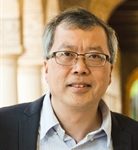 Dr Ming Feng co-leads the Coupled warm pool dynamics in the Indo-Pacific project. Dr Feng Joined CSIRO in 2001. His research career has focused on climate variability in the Pacific and Indian Ocean, ocean boundary current and eddy dynamics, upper ocean processes, and biophysical coupling, using in situ observations, remote sensing information, and numerical models. He also participated in a number of research voyages in tropical Pacific, southeast Indian Ocean, and western Pacific marginal seas. Dr Feng has served on World Climate Research Programme (WCRP) Climate Variability and Predictability (CLIVAR) Indian Ocean Panel.
Dr Ming Feng co-leads the Coupled warm pool dynamics in the Indo-Pacific project. Dr Feng Joined CSIRO in 2001. His research career has focused on climate variability in the Pacific and Indian Ocean, ocean boundary current and eddy dynamics, upper ocean processes, and biophysical coupling, using in situ observations, remote sensing information, and numerical models. He also participated in a number of research voyages in tropical Pacific, southeast Indian Ocean, and western Pacific marginal seas. Dr Feng has served on World Climate Research Programme (WCRP) Climate Variability and Predictability (CLIVAR) Indian Ocean Panel.

Image source: ACE CRC
Dr Beatriz Peña-Molino is a member of the Indo-Pacific inter-basin exchange project team. Prior to joining CSIRO she completed a PhD in Physical Oceanography from the MIT-WHOI Joint Program (USA). Her work then focused on the western North Atlantic, looking at the interaction between the deep and the upper limbs of the Meridional Overturning Circulation. In 2011 Dr Peña-Molino came to Australia and joined the Antarctic Climate and Ecosystems Cooperative Research centre, where she worked in problems related to the dynamics of the Antarctic Circumpolar Current and its interaction with topography, formation and export of Antarctic Bottom Water, and ice shelf-ocean interactions in the Antarctic margins. As part of the Indo-Pacific Interbasin Exchange project Dr Peña-Molino is now working towards characterizing the different scales of variability in the Indonesian Througflow (ITF). Using both in situ and remote observations she hopes to contribute to our understanding of the forcing mechanisms of the ITF and how the ITF impacts climate both at the regional and global scales. When she is not thinking about the ever-changing tropical ocean, Dr. Peña-Molino also continues to explore the role of the Southern Ocean in climate as part of her work.
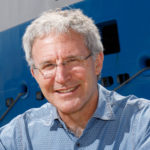 Dr Steve Rintoul leads the Southern Ocean observations and change project. Dr Rintoul is a physical oceanographer with a long-standing interest in the Southern Ocean and its role in the earth system. His research has contributed to a deeper appreciation of the influence of the Southern Ocean on regional and global climate, biogeochemical cycles and biological productivity. Born in the USA, he did his graduate studies at the MIT-WHOI Joint Program and postdoctoral work at Princeton before moving to Australia to take up a position at the CSIRO. His scientific interests include the dynamics of the Antarctic Circumpolar Current, the Southern Ocean overturning circulation, water mass formation, and the influence of Southern Ocean currents on biology and biogeochemistry. Primarily an observational oceanographer, Dr Rintoul has led 15 expeditions to the Southern, Indian and Pacific Oceans. Over the last twenty years, Dr Rintoul has co-chaired international panels responsible for each of the major climate research programs carried out in the Southern Ocean. More recently, he led the Climate of Antarctica and the Southern Ocean program of the International Polar Year and the development of international plans for a Southern Ocean Observing System. He was a Coordinating Lead Author of the Oceans chapter in the 5th Assessment Report of the Intergovernmental Panel on Climate Change (IPCC). His scientific achievements have been recognised by many national and international awards (Photo by Peter Mathew).
Dr Steve Rintoul leads the Southern Ocean observations and change project. Dr Rintoul is a physical oceanographer with a long-standing interest in the Southern Ocean and its role in the earth system. His research has contributed to a deeper appreciation of the influence of the Southern Ocean on regional and global climate, biogeochemical cycles and biological productivity. Born in the USA, he did his graduate studies at the MIT-WHOI Joint Program and postdoctoral work at Princeton before moving to Australia to take up a position at the CSIRO. His scientific interests include the dynamics of the Antarctic Circumpolar Current, the Southern Ocean overturning circulation, water mass formation, and the influence of Southern Ocean currents on biology and biogeochemistry. Primarily an observational oceanographer, Dr Rintoul has led 15 expeditions to the Southern, Indian and Pacific Oceans. Over the last twenty years, Dr Rintoul has co-chaired international panels responsible for each of the major climate research programs carried out in the Southern Ocean. More recently, he led the Climate of Antarctica and the Southern Ocean program of the International Polar Year and the development of international plans for a Southern Ocean Observing System. He was a Coordinating Lead Author of the Oceans chapter in the 5th Assessment Report of the Intergovernmental Panel on Climate Change (IPCC). His scientific achievements have been recognised by many national and international awards (Photo by Peter Mathew).
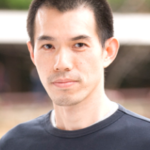 Dr Agus Santoso is a Senior Research Associate at UNSW, an Adjunct Science Leader at CSIRO, and an associate investigator at the ARC Centre of Excellence for Climate System Science. Dr Santoso is a former member of the WCRP CLIVAR Pacific Panel, and is an associate editor at the Journal of Climate. He was awarded a PhD in applied mathematics/physical oceanography in 2006 by the UNSW School of Mathematics and Statistics. His current research focuses on the dynamics of tropical climate variability such as El Nino Southern Oscillation and Indian Ocean Dipole, and co-leads the ENSO and IOD project.
Dr Agus Santoso is a Senior Research Associate at UNSW, an Adjunct Science Leader at CSIRO, and an associate investigator at the ARC Centre of Excellence for Climate System Science. Dr Santoso is a former member of the WCRP CLIVAR Pacific Panel, and is an associate editor at the Journal of Climate. He was awarded a PhD in applied mathematics/physical oceanography in 2006 by the UNSW School of Mathematics and Statistics. His current research focuses on the dynamics of tropical climate variability such as El Nino Southern Oscillation and Indian Ocean Dipole, and co-leads the ENSO and IOD project.
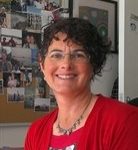 Dr Bernadette Sloyan leads the Indo-Pacific inter-basin exchange project. She is a Chief Research Scientist with CSIRO Oceans and Atmosphere. Her scientific interests are documenting and understanding the role of ocean circulation and variability in the global climate system. Her work is focused on key ocean processes (circulation, mixing and air-sea interactions) in the Southern, Pacific and Indian Oceans that improve our understanding of the role of the ocean in setting and moderating the earth’s climate. Dr Sloyan’s position as the Co-Chair of the international Global Ocean Ship-based Hydrographic Investigations Program (GO-SHIP) and co-chair of the Ocean Observations Physics and Climate (OOPC) panel recognise her national and international leadership in ocean climate research.
Dr Bernadette Sloyan leads the Indo-Pacific inter-basin exchange project. She is a Chief Research Scientist with CSIRO Oceans and Atmosphere. Her scientific interests are documenting and understanding the role of ocean circulation and variability in the global climate system. Her work is focused on key ocean processes (circulation, mixing and air-sea interactions) in the Southern, Pacific and Indian Oceans that improve our understanding of the role of the ocean in setting and moderating the earth’s climate. Dr Sloyan’s position as the Co-Chair of the international Global Ocean Ship-based Hydrographic Investigations Program (GO-SHIP) and co-chair of the Ocean Observations Physics and Climate (OOPC) panel recognise her national and international leadership in ocean climate research.
 Dr Guojian Wang is a Research Scientist at CSIRO, Australia. He is a co-leader of the ENSO and IOD project in the Centre for Southern Hemisphere Oceans Research. His interest spans from mechanisms of extreme ENSO & extreme pIOD, their impacts on regional and global climate, and their response to greenhouse warming, to evaluation and benchmark of climate models for examination of climate simulation and climate projection.
Dr Guojian Wang is a Research Scientist at CSIRO, Australia. He is a co-leader of the ENSO and IOD project in the Centre for Southern Hemisphere Oceans Research. His interest spans from mechanisms of extreme ENSO & extreme pIOD, their impacts on regional and global climate, and their response to greenhouse warming, to evaluation and benchmark of climate models for examination of climate simulation and climate projection.
 Dr Xuebin Zhang leads the Southern Ocean sea-level change project. Dr Zhang is a Senior Research Scientist working at CSIRO’s Oceans and Atmosphere Business Unit in Australia. He obtained his PhD in Oceanography from the University of Washington (U.S.) and undertook his postdoctoral training at Scripps Institution of Oceanography (U.S.). In 2010, he joined CSIRO as a sea-level scientist, and has been actively working on sea-level rise, climate change and variability, ocean and climate modelling. Dr Zhang has published over 30 articles in high-profile professional journals, including three in the Nature publishing group. His works on sea-level rise have established him as an outstanding mid-career expert in the field. He also gained worldwide recognition: through service on international research advisory panels, such as the Pacific Panel of the Climate Variability, Predictability and Change (CLIVAR) program; through invited and plenary talks at international conferences and workshops; by convening special sessions at several international conferences; and by granting interviews to leading news outlets like the Washington Post and Agence France Presse.
Dr Xuebin Zhang leads the Southern Ocean sea-level change project. Dr Zhang is a Senior Research Scientist working at CSIRO’s Oceans and Atmosphere Business Unit in Australia. He obtained his PhD in Oceanography from the University of Washington (U.S.) and undertook his postdoctoral training at Scripps Institution of Oceanography (U.S.). In 2010, he joined CSIRO as a sea-level scientist, and has been actively working on sea-level rise, climate change and variability, ocean and climate modelling. Dr Zhang has published over 30 articles in high-profile professional journals, including three in the Nature publishing group. His works on sea-level rise have established him as an outstanding mid-career expert in the field. He also gained worldwide recognition: through service on international research advisory panels, such as the Pacific Panel of the Climate Variability, Predictability and Change (CLIVAR) program; through invited and plenary talks at international conferences and workshops; by convening special sessions at several international conferences; and by granting interviews to leading news outlets like the Washington Post and Agence France Presse.
Dr Zhang has secured millions of dollars in research funding and has been leading several large research projects, such as the Pacific-Australia Climate Change Science and Adaptation Planning (PACCSAP) Sea Level Project, CSIRO ocean downscaling strategic project, and the CSHOR sea level project. He is also very active in academic supervision – so far he has supervised two postdoctoral fellows, two PhD students and two honours students.
Project Staff
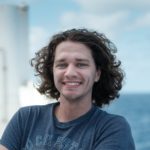
Dr Chris Chapman works as a Research Scientist at CSIRO and is a member of the Coupled warm pool dynamics in the Indo-Pacific project team. Dr Chapman completed his PhD in 2014, studying geophysical fluid dynamics in a joint program between the Australian National University, CSIRO and Laboratoire d’Etudes en Geophysique et Oceanographie Spatiales (LEGOS), Toulouse. During his PhD, he used a variety of observations and simplified models to try to understand turbulence and variability in the ocean. After his PhD, he worked as a National Science Foundation postdoctoral fellow at the Sorbonne Universities in Paris, undertaking a variety of studies ranging from detailed physical investigations of the oceans broad scale circulation to using advanced machine learning algorithms for estimating the ocean state at depth from satellite observations, to observational studies of sea-ice/ocean interaction. Prior to undertaking his PhD, he worked for a small wind energy company developing numerical models of lower atmospheric turbulence and as a weather forecaster for the Australian Bureau of Meteorology. Dr Chapman joined CSIRO in late-2017 where he has worked on fundamental ocean and atmospheric dynamics and how they can be exploited to improve near term climate predictions (Image source: Thomas Moore, CSIRO, 2019).
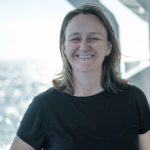 Ms Rebecca Cowley leads the IMOS eXpendable BathyThermograph (XBT) Ship Of Opportunity Program (SOOP) and is a member of the Coupled warm pool dynamics in the Indo-Pacific project team. Ms Cowley develops quality control (QC) procedures and data analysis tools for various oceanographic data including deep-water moorings from the Indonesian Throughflow and East Australian Current datasets and XBT data. Previously she managed the Argo Real Time data system, was a sea-going hydrochemist and has participated in 14 voyages, including as Principal Investigator. Ms Cowley is currently the Chair of the international Ship Of Opportunity Program Implementation Panel (SOOPIP) program and is a member of the steering team for the International Quality-controlled Ocean Database (IQuOD) project (Image source: Thomas Moore, CSIRO, 2019).
Ms Rebecca Cowley leads the IMOS eXpendable BathyThermograph (XBT) Ship Of Opportunity Program (SOOP) and is a member of the Coupled warm pool dynamics in the Indo-Pacific project team. Ms Cowley develops quality control (QC) procedures and data analysis tools for various oceanographic data including deep-water moorings from the Indonesian Throughflow and East Australian Current datasets and XBT data. Previously she managed the Argo Real Time data system, was a sea-going hydrochemist and has participated in 14 voyages, including as Principal Investigator. Ms Cowley is currently the Chair of the international Ship Of Opportunity Program Implementation Panel (SOOPIP) program and is a member of the steering team for the International Quality-controlled Ocean Database (IQuOD) project (Image source: Thomas Moore, CSIRO, 2019).
 Dr Kathy Gunn is a CSIRO Postdoctoral Fellow and a member of the Southern Ocean dynamics, circulation and water mass formation project team. Her research uses physical and acoustic observations to better understand water mass variability at a range of scales. She has worked on warm water transport in the west Antarctic Peninsula, mixing at fronts in the Southwest Atlantic, and small-scale to large-scale temperature and salinity variability in the Indian Ocean. As a member of the CSHOR team, Dr Gunn will use classic and state-of-the-art hydrographic observations to quantify the ventilation of bottom water over time and space.
Dr Kathy Gunn is a CSIRO Postdoctoral Fellow and a member of the Southern Ocean dynamics, circulation and water mass formation project team. Her research uses physical and acoustic observations to better understand water mass variability at a range of scales. She has worked on warm water transport in the west Antarctic Peninsula, mixing at fronts in the Southwest Atlantic, and small-scale to large-scale temperature and salinity variability in the Indian Ocean. As a member of the CSHOR team, Dr Gunn will use classic and state-of-the-art hydrographic observations to quantify the ventilation of bottom water over time and space.

Dr Laura Herraiz-Borreguero is a Research Scientist at CSIRO and a member of the Southern Ocean observations and change project team. Dr Herraiz-Borreguero received her PhD in physical oceanography in 2009 from the University of Tasmania. Before joining CSIRO in June 2018, Dr Herraiz-Borreguero was a Marie Curie Research Fellow at the University of Southampton, UK. During this time, her research evolved from open ocean/large scale physical processes in the ocean to polar oceanography and Ice shelf-ocean interactions. From 2014 to 2016, Dr Herraiz-Borreguero worked as a postdoctoral researcher at the Centre for Ice and Climate in Copenhagen, Denmark and from 2010 to 2013, she was a Postdoctoral Research Fellow at the Antarctic Climate and Ecosystems CRC in Hobart, Tasmania. She led several papers on the coupling of the ocean with the Amery Ice Shelf, East Antarctica. This work used a unique set of observations from boreholes drilled through the ice shelf by the Australian Antarctic Division’s AMISOR project.
 Dr Yuehua (Veronica) Li is a Research Associate at Climate Change Research Centre, UNSW and a member of the Southern Ocean sea-level change project team. Dr Li’s research interests are analytic and numerical ocean modelling, data analysis and machine learning. She joined CCRC in July 2018 after graduating with a Ph.D. at University of New South Wales. Dr Li currently works with Prof. John Church and Prof. Trevor McDougall, on analysing historical profiles of ocean temperature and salinity profiles, mapping these profiles to a regular grid and also estimating global ocean heat content changes.
Dr Yuehua (Veronica) Li is a Research Associate at Climate Change Research Centre, UNSW and a member of the Southern Ocean sea-level change project team. Dr Li’s research interests are analytic and numerical ocean modelling, data analysis and machine learning. She joined CCRC in July 2018 after graduating with a Ph.D. at University of New South Wales. Dr Li currently works with Prof. John Church and Prof. Trevor McDougall, on analysing historical profiles of ocean temperature and salinity profiles, mapping these profiles to a regular grid and also estimating global ocean heat content changes.
 Dr Kewei Lyu joined CSIRO and CSHOR in February 2018 as a Postdoctoral Fellow. His research focuses on the Southern Ocean sea-level change and the associated ocean heat uptake and redistribution.
Dr Kewei Lyu joined CSIRO and CSHOR in February 2018 as a Postdoctoral Fellow. His research focuses on the Southern Ocean sea-level change and the associated ocean heat uptake and redistribution.
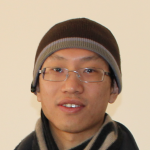 Dr Benjamin Ng is a CSIRO Research Scientist working on the ENSO and IOD project. His main research interests include tropical climate dynamics and variability with a primary focus on the IOD. Dr Ng aims to understand how the IOD and its properties respond to greenhouse warming using coupled models and simulations. He is also interested in ENSO and the interaction between tropical basins.
Dr Benjamin Ng is a CSIRO Research Scientist working on the ENSO and IOD project. His main research interests include tropical climate dynamics and variability with a primary focus on the IOD. Dr Ng aims to understand how the IOD and its properties respond to greenhouse warming using coupled models and simulations. He is also interested in ENSO and the interaction between tropical basins.
 Dr Océane Richet is a CSIRO Postdoctoral Fellow and a member of the Indo-Pacific inter-basin exchange project team. Her scientific interest is the study of ocean processes connected to global oceanic circulation. An example of her recent work was to study the role of internal tides on deep mixing. Dr Richet graduated in December 2017 from École polytechnique, France. The title of her thesis is, ‘Impact of ocean waves on deep waters mixing and large-scale circulation’.
Dr Océane Richet is a CSIRO Postdoctoral Fellow and a member of the Indo-Pacific inter-basin exchange project team. Her scientific interest is the study of ocean processes connected to global oceanic circulation. An example of her recent work was to study the role of internal tides on deep mixing. Dr Richet graduated in December 2017 from École polytechnique, France. The title of her thesis is, ‘Impact of ocean waves on deep waters mixing and large-scale circulation’.
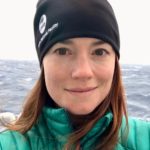 Dr Elizabeth Shadwick is a Senior Research Scientist at CSIRO and a member of the Southern Ocean dynamics, circulation and water mass formation project team. She is interested in the marine carbon cycle and distinguishing between natural variability and anthropogenic change. She has worked on carbon chemistry and ocean acidification across many environments from the North Atlantic, to the Arctic, to the Southern Ocean. Her work is based on observations, laboratory analyses, and increasingly, on autonomous sensors deployed on moorings. Dr Shadwick leads the IMOS Southern Ocean Time Series (SOTS) sub-facility, and is the Co-Chair of the SOOS Indian Ocean Regional Working Group. Current research projects include a moored CO2-system observatory on the continental shelf of the West Antarctic Peninsula, investigation of decadal scale trends in ocean chemistry at SOTS, and an ongoing interest in the changing biogeochemistry of the East Antarctic coastal region.
Dr Elizabeth Shadwick is a Senior Research Scientist at CSIRO and a member of the Southern Ocean dynamics, circulation and water mass formation project team. She is interested in the marine carbon cycle and distinguishing between natural variability and anthropogenic change. She has worked on carbon chemistry and ocean acidification across many environments from the North Atlantic, to the Arctic, to the Southern Ocean. Her work is based on observations, laboratory analyses, and increasingly, on autonomous sensors deployed on moorings. Dr Shadwick leads the IMOS Southern Ocean Time Series (SOTS) sub-facility, and is the Co-Chair of the SOOS Indian Ocean Regional Working Group. Current research projects include a moored CO2-system observatory on the continental shelf of the West Antarctic Peninsula, investigation of decadal scale trends in ocean chemistry at SOTS, and an ongoing interest in the changing biogeochemistry of the East Antarctic coastal region.
Students
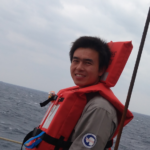 Mr Saisai Hou is a visiting PhD student from the Ocean University of China and a member of the Southern Ocean observations and change project team. His research interest focuses on impacts of polynyas on water masses in Prydz Bay. Mr Hou is sponsored by the China Scholarship Council.
Mr Saisai Hou is a visiting PhD student from the Ocean University of China and a member of the Southern Ocean observations and change project team. His research interest focuses on impacts of polynyas on water masses in Prydz Bay. Mr Hou is sponsored by the China Scholarship Council.

Mr Zhi Li received an MSc from the Ocean University of China in 2018. He commenced his PhD at UNSW in August of the same year. A member of the Southern Ocean dynamics, circulation and water mass formation project team, Mr Zhi’s initial work is diagnosing Subantarctic Mode Water formation and variability (and drivers) using Argo data and atmospheric reanalysis products for buoyancy fluxes. Mr Zhi is sponsored by the China Scholarship Council.
 Ms Anna Maggiorano is a PhD student at the University of New South Wales, Canberra, Australia and a member of the Coupled warm pool dynamics in the Indo-Pacific project team. She received her Bachelor in physics at the University of Pisa and a Master’s degree in Physics of the Earth System from the University of Bologna, in Italy, with a focus on Physical Oceanography. Her current research is directed towards investigating the role of the diurnal cycle of sea surface temperature on the dynamics of the North Western shelf of Australia.
Ms Anna Maggiorano is a PhD student at the University of New South Wales, Canberra, Australia and a member of the Coupled warm pool dynamics in the Indo-Pacific project team. She received her Bachelor in physics at the University of Pisa and a Master’s degree in Physics of the Earth System from the University of Bologna, in Italy, with a focus on Physical Oceanography. Her current research is directed towards investigating the role of the diurnal cycle of sea surface temperature on the dynamics of the North Western shelf of Australia.
 Mr Saurabh Rathore is a University of Tasmania, Institute for Marine and Antarctic Studies (IMAS), PhD student and a member of the Coupled warm pool dynamics in the Indo-Pacific project team. In 2015, Mr Rathore completed his Master of Technology in Earth System Science at the Indian Institute of Technology-Kharaghpur (IIT KGP). In 2012, he completed a Bachelor of Aerospace Engineering from The Aeronautical Society of India (AeSI). Mr Rathore is currently working on the impact of recent Indian Ocean warming on the circulation, water mass distribution and air-sea interaction in the Indian Ocean. His work is funded by the National Environmental Science Programme (NESP) – Earth Systems and Climate Change (ESCC) Hub.
Mr Saurabh Rathore is a University of Tasmania, Institute for Marine and Antarctic Studies (IMAS), PhD student and a member of the Coupled warm pool dynamics in the Indo-Pacific project team. In 2015, Mr Rathore completed his Master of Technology in Earth System Science at the Indian Institute of Technology-Kharaghpur (IIT KGP). In 2012, he completed a Bachelor of Aerospace Engineering from The Aeronautical Society of India (AeSI). Mr Rathore is currently working on the impact of recent Indian Ocean warming on the circulation, water mass distribution and air-sea interaction in the Indian Ocean. His work is funded by the National Environmental Science Programme (NESP) – Earth Systems and Climate Change (ESCC) Hub.
 Miss Jinping Wang is a visiting PhD student from the Ocean University of China and a member of the Southern Ocean sea-level change project team. Her primary research interest focuses on quantifying internal variability and climate change signals in regional sea levels based on a suite of ocean/climate models. Miss Wang is sponsored by the China Scholarship Council.
Miss Jinping Wang is a visiting PhD student from the Ocean University of China and a member of the Southern Ocean sea-level change project team. Her primary research interest focuses on quantifying internal variability and climate change signals in regional sea levels based on a suite of ocean/climate models. Miss Wang is sponsored by the China Scholarship Council.
 Mr Jingwei Zhang is a PhD student at the University of Tasmania and a member of the Southern Ocean sea-level change project team. He received his Bachelor in physical oceanography at the University of Tasmania and the Ocean University of China. His current research is directed towards investigating the response of Southern Ocean circulation and sea level to the freshwater input from Antarctica.
Mr Jingwei Zhang is a PhD student at the University of Tasmania and a member of the Southern Ocean sea-level change project team. He received his Bachelor in physical oceanography at the University of Tasmania and the Ocean University of China. His current research is directed towards investigating the response of Southern Ocean circulation and sea level to the freshwater input from Antarctica.
 Ms Shujing Zhang is a University of Tasmania honours student and a member of Southern Ocean sea-level change project team. Working with Dr Xuebin Zhang and Prof Matt King, her initial research interest is in developing high-resolution sea level fingerprints associated with land-ice mass change using the sea-level module of Ice Sheet System Model (ISSM), and exploring the sensitivity of fingerprints to uncertainties in future land-ice mass change.
Ms Shujing Zhang is a University of Tasmania honours student and a member of Southern Ocean sea-level change project team. Working with Dr Xuebin Zhang and Prof Matt King, her initial research interest is in developing high-resolution sea level fingerprints associated with land-ice mass change using the sea-level module of Ice Sheet System Model (ISSM), and exploring the sensitivity of fingerprints to uncertainties in future land-ice mass change.
Support Staff
 Mr Chris Gerbing is Communication Manager, CSIRO Oceans and Atmosphere. Mr Gerbing is a science communicator responsible for managing communications, marketing and public relations at CSIRO’s Oceans and Atmosphere. He has been at CSIRO for six years, before which he worked for the Victorian state government supporting agricultural industries and service providers to integrate climate change into their planning and service delivery. Mr Gerbing graduated with a Masters in Arts (Media and Communications) from Swinburne University and a Bachelor Degree in Arts (film) / Science (climate) with Honours.
Mr Chris Gerbing is Communication Manager, CSIRO Oceans and Atmosphere. Mr Gerbing is a science communicator responsible for managing communications, marketing and public relations at CSIRO’s Oceans and Atmosphere. He has been at CSIRO for six years, before which he worked for the Victorian state government supporting agricultural industries and service providers to integrate climate change into their planning and service delivery. Mr Gerbing graduated with a Masters in Arts (Media and Communications) from Swinburne University and a Bachelor Degree in Arts (film) / Science (climate) with Honours.
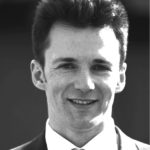 Mr Hugh Kater is a Business Development Manager for CSIRO’s Oceans and Atmosphere Business Unit, focusing on building science and technology collaboration between CSIRO and China. Before joining CSIRO, Mr Kater lived in China from 2011 to 2016, holding roles with Atkins Global, as the China representative for Atkins Global’s nuclear waste services division, and as the General Manager of the China Carbon Forum (CCF). His achievements at CCF include developing research services, and tripling the organisations revenue between 2012 and 2014. Mr Kater co-authored China’s first Carbon pricing survey in 2013. He conducted more than 20 high-level climate change events in Beijing; and established new cooperation with governments, consulting firms, and academic institutions. Prior to 2011, Mr Kater worked in the private sector in Australia, including in corporate environmental program management and procurement. Mr Kater holds a Masters degree in Environmental Management and is proficient in Chinese.
Mr Hugh Kater is a Business Development Manager for CSIRO’s Oceans and Atmosphere Business Unit, focusing on building science and technology collaboration between CSIRO and China. Before joining CSIRO, Mr Kater lived in China from 2011 to 2016, holding roles with Atkins Global, as the China representative for Atkins Global’s nuclear waste services division, and as the General Manager of the China Carbon Forum (CCF). His achievements at CCF include developing research services, and tripling the organisations revenue between 2012 and 2014. Mr Kater co-authored China’s first Carbon pricing survey in 2013. He conducted more than 20 high-level climate change events in Beijing; and established new cooperation with governments, consulting firms, and academic institutions. Prior to 2011, Mr Kater worked in the private sector in Australia, including in corporate environmental program management and procurement. Mr Kater holds a Masters degree in Environmental Management and is proficient in Chinese.

Mrs Brenda Tuckwood is a Finance and Projects Advisor with the Climate Science Centre, CSIRO Oceans and Atmosphere.
 Ms Leonie Wyld is CSHOR’s Project Support Officer.
Ms Leonie Wyld is CSHOR’s Project Support Officer.
Collaborators
Prof Xianyao Chen (OUC)
Prof John Church (UNSW)
Dr Harry Hendon (BoM)
 Prof Matt King is a Professor of Polar Geodesy at the University of Tasmania, Australia. He works within the Surveying and Spatial Sciences group, forming a part of UTAS researchers working on solid earth geophysics, geodesy and sea-level change. In particular, his work focuses on the use of geodetic tools to solve problems related to Earth geophysics, notably sea-level change, polar ice mass balance and Earth deformation. His field of expertise is geodetic observation of the global water cycle, including ice sheet mass balance and sea level change and particularly using the Global Positioning System (GPS) and the Gravity Recovery and Climate Experiment (GRACE). He also works on numerical modelling of solid Earth processes and the reduction of systematic and random errors in geodetic techniques in order to maximise the information content in the data and improve the reliability of the interpretations.
Prof Matt King is a Professor of Polar Geodesy at the University of Tasmania, Australia. He works within the Surveying and Spatial Sciences group, forming a part of UTAS researchers working on solid earth geophysics, geodesy and sea-level change. In particular, his work focuses on the use of geodetic tools to solve problems related to Earth geophysics, notably sea-level change, polar ice mass balance and Earth deformation. His field of expertise is geodetic observation of the global water cycle, including ice sheet mass balance and sea level change and particularly using the Global Positioning System (GPS) and the Gravity Recovery and Climate Experiment (GRACE). He also works on numerical modelling of solid Earth processes and the reduction of systematic and random errors in geodetic techniques in order to maximise the information content in the data and improve the reliability of the interpretations.
Prof King has authored more than 100 peer-reviewed publications, including several in Nature, Science and PNAS. He has received several major prizes, notably the 2015 Kavli Medal and Lecture by the Royal Society (London) and the 2018 Mawson Medal and Lecture by the Australian Academy of Sciences. He contributes to the Southern Ocean sea-level change project.
Prof Trevor McDougall (UNSW)
Dr Maxim Nikurashin (UTAS)
Dr Helen Phillips (UTAS)
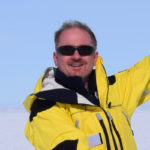 Dr Steven Phipps is an ice sheet modeller, climate system modeller and palaeoclimatologist, based within the Institute for Marine and Antarctic Studies at the University of Tasmania in Hobart. His research aims to understand past changes in Antarctica and the climate of the Southern Hemisphere, particularly during the period from the Last Glacial Maximum (around 21,000 years ago) to present. To approach this problem, he uses a combination of ice sheet models, climate system models and natural archives, such as ice cores, tree rings and corals. His core research interests are: past changes in the Antarctic Ice Sheet, including its contribution towards changes in global sea level; past climate variability and change in the southern hemisphere; and techniques for integrating numerical models with data from natural archives. Dr Phipps contributes to the Southern Ocean sea-level change project.
Dr Steven Phipps is an ice sheet modeller, climate system modeller and palaeoclimatologist, based within the Institute for Marine and Antarctic Studies at the University of Tasmania in Hobart. His research aims to understand past changes in Antarctica and the climate of the Southern Hemisphere, particularly during the period from the Last Glacial Maximum (around 21,000 years ago) to present. To approach this problem, he uses a combination of ice sheet models, climate system models and natural archives, such as ice cores, tree rings and corals. His core research interests are: past changes in the Antarctic Ice Sheet, including its contribution towards changes in global sea level; past climate variability and change in the southern hemisphere; and techniques for integrating numerical models with data from natural archives. Dr Phipps contributes to the Southern Ocean sea-level change project.
Dr Christopher Watson (UTAS)